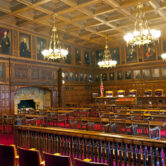WASHINGTON (CN) - A Colorado baker who refused to design a wedding cake for a gay couple because of his Christian beliefs won a 7-2 reversal Monday from the U.S. Supreme Court.
Resolving the case on narrow grounds, the majority found that the Colorado Civil Rights Commission evinced bias when it considered the discrimination charge against the Masterpiece Cakeshop and its owner, Jack Phillips.
“The neutral and respectful consideration to which Phillips was entitled was compromised here,” Justice Anthony Kennedy wrote for the court, going on to cite “elements of a clear and impermissible hostility toward the sincere religious beliefs that motivated” Phillips to object to baking for Charlie Craig and Dave Mullins.
As quoted in the ruling, several commissioners made no effort to disguise their contempt for the concept of sincerely held religious beliefs when they held proceedings on the Masterpiece Cakeshop case in 2014.
“Freedom of religion and religion has been used to justify all kinds of discrimination throughout history, whether it be slavery, whether it be the holocaust, whether it be — I mean, we — we can list hundreds of situations where freedom of religion has been used to justify discrimination,” a commissioner said. “And to me it is one of the most despicable pieces of rhetoric that people can use to — to use their religion to hurt others.”
Kennedy called the point clearly disparaging. Holocaust and slavery comparisons notwithstanding, Kennedy emphasized, the commissioner described faith as despicable and “as merely rhetorical — something insubstantial and even insincere.”
“This sentiment is inappropriate for a commission charged with the solemn responsibility of fair and neutral enforcement of Colorado’s anti-discrimination law — a law that protects discrimination on the basis of religion as well as sexual orientation,” Kennedy added.
Resolving Mullins and Craig’s discrimination charge will be difficult, Kennedy noted later, but it cannot be achieved at the expense of the neutral consideration that Phillips should be afforded to raise sincere religious objections.
“The official expressions of hostility to religion in some of the commissioners’ comments — comments that were not disavowed at the commission or by the state at any point in the proceedings that led to affirmance of the order — were inconsistent with what the Free Exercise Clause requires,” Kennedy wrote. “The commission’s disparate consideration of Phillips’ case compared to the cases of the other bakers suggests the same. For these reasons, the order must be set aside.”
Justice Sonia Sotomayor joined a dissent meanwhile by Justice Ruth Bader Ginsburg.
“Whatever one may think of the statements in historical context, I see no reason why the comments of one or two commissioners should be taken to overcome Phillips’ refusal to sell a wedding cake to Craig and Mullins,” Ginsburg wrote. “The proceedings involved several layers of independent decisionmaking, of which the commission was but one.”
After noting that both an administrative law judge and the Colorado Court of Appeals sided against Phillips as well, Ginsburg asked what prejudice infected their determinations.
Alliance Defending Freedom, which represents Phillips, received the ruling warmly.
“Praise God,” Sarah Kramer, the group’s digital content specialist, said in a blog post Monday.






